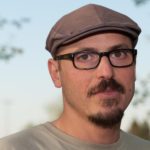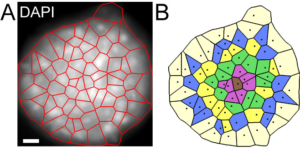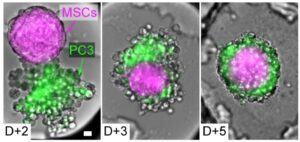A post-doctoral position is available in the newly founded team on Physical microfluidics and Bioengineering at Institut Pasteur (Paris). The aim of this project is to explore the heterogeneity of structural organization in cell spheroids and to relate this heterogeneity to variations in biological function.
Scientific Context: Three-dimensional (3D) cell cultures are rapidly emerging as an im- portant platform to mimic in vivo behavior. One approach for 3D culture is to form cell aggregates, in the form of spheroids or organoids. These 3D cultures develop a well-organized structure that couples back to the biological function of the cells through a range of physical, chemical, and biological processes, many of which remain unexplored.
Our group has recently developed an integrated microfluidic platform for spheroid forma- tion and study [1]. The device allows measurements on thousands of spheroids and hundreds of thousands of cells, with a single-cell resolution within each spheroid. In this way we may now obtain detailed quantitative measurements whith very high statistical significance, while finely controlling the conditions of each of the spheroids.
We now wish to use our ability to obtain vast amounts of data to explore the heterogeneity of structure and biological function. The choice of the particular biological system will be defined with the new post-doc. For example, we can ask how the presence of stromal cells modifies the structure of cancer spheroids and their response to drugs or cellular therapies, or to study the interactions between neurons, astrocytes, and microglia in neurospheres, or between differentiating stem cells during the growth of an embryoid body.
The final goal is to use the 3D format to gain new insight about the interplay between physical structure and biological function in vivo, while developing tools that we hope will be transferable to other labs worldwide.
The research lab: Our research group is a joint team supported by Institut Pasteur (Paris) and Ecole Polytechnique (Palaiseau), two of the top research institutions in France. The new post-doc will work closely with different members of the group, which is currently made up of about 10 physicists, engineers, and biologists. Other projects in the lab involve looking at antibiotic resistance in bacterial colonies, as well as fluid dynamics and soft matter questions.
The group is well integrated on both the Pasteur and Polytechnique campuses. The new postdoc will also be encouraged to interact with other neighboring teams, which will provide access to the wealth of scientific and technical resources available at each of the institutions.
The candidate: The candidate should have a strong track record in biophysics or quan- titative biology, although exceptionnal candidates with a cell biology background will be considered if they wish to address single-cell issues. He/she should be able to run complex experiments that involve both physical and biological aspects, as well as the analysis of mi- croscopy images and large sets of data. As such the ability to work across disciplines will be necessary. Knowledge of microfluidics techniques is not a requirement.
To apply: The initial duration will be for two years with a possibility to renew the contract. The start date is in the fall 2018, or as soon as the position is filled. Please note that, due to the large number of responses, applications will be screened and only scientifically relevant ones will be pursued. Therefore applicants should state clearly their main contributions in the field of biophysics or quantitative cell biology in their cover letter. To apply, please send a CV with publication list and the names of two referees to Charles Baroud: charles.baroud@pasteur.fr .
[1] S. Sart, R. F.-X. Tomasi, G. Amselem and C. N. Baroud, Nat. Commun., 2017, 8, 469.




